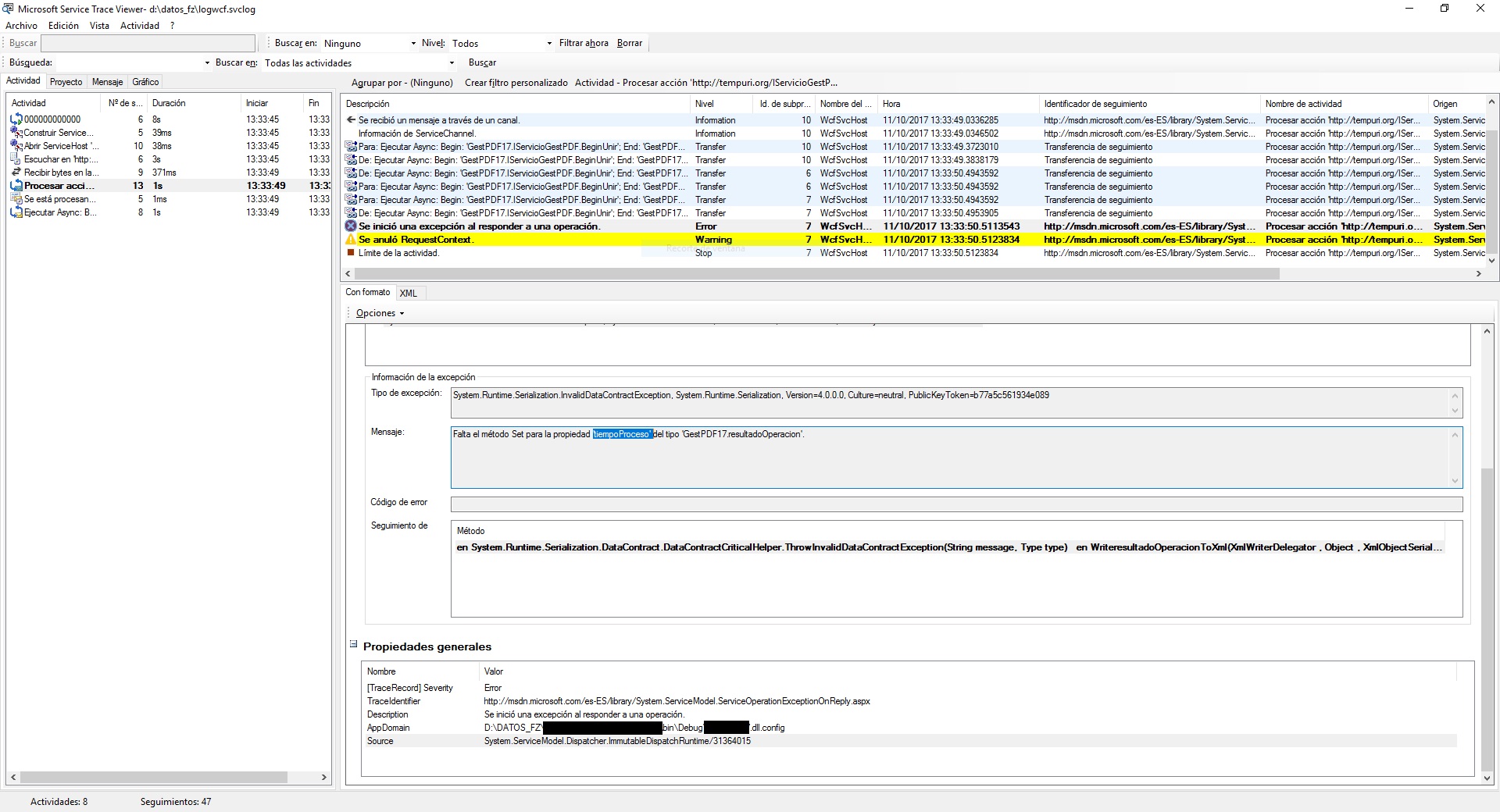Windows Communication Foundation agrega eventos en el registro de Windows de manera predeterminada, por seguridad, depuración, mantenibilidad… es posible utilizar mecanimos adicionales con las trazas.
Añadiendo la siguiente configuración de diagnóstico en nuestro web.config o app.exe.config:
<configuration>
<system.diagnostics>
<sources>
<source name="System.ServiceModel"
switchValue="Information, ActivityTracing"
propagateActivity="true">
<listeners>
<add name="traceListener"
type="System.Diagnostics.XmlWriterTraceListener"
initializeData= "D:\log\registro.svclog" />
</listeners>
</source>
</sources>
</system.diagnostics>
</configuration>
Posible errores no visibles, dificiles de acotar o reproducir aparecen claros y detallados, hasta el más sencillo que se nos puede pasar por alto:
en System.Runtime.Serialization.DataContract.DataContractCriticalHelper.ThrowInvalidDataContractException(String message, Type type) en WriteresultadoOperacionToXml(XmlWriterDelegator , Object , XmlObjectSerializerWriteContext , ClassDataContract ) en System.Runtime.Serialization.ClassDataContract.WriteXmlValue(XmlWriterDelegator xmlWriter, Object obj, XmlObjectSerializerWriteContext context) en System.Runtime.Serialization.XmlObjectSerializerWriteContext.WriteDataContractValue(DataContract dataContract, XmlWriterDelegator xmlWriter, Object obj, RuntimeTypeHandle declaredTypeHandle) en System.Runtime.Serialization.XmlObjectSerializerWriteContext.SerializeWithoutXsiType(DataContract dataContract, XmlWriterDelegator xmlWriter, Object obj, RuntimeTypeHandle declaredTypeHandle) en System.Runtime.Serialization.DataContractSerializer.InternalWriteObjectContent(XmlWriterDelegator writer, Object graph, DataContractResolver dataContractResolver) en System.Runtime.Serialization.DataContractSerializer.InternalWriteObject(XmlWriterDelegator writer, Object graph, DataContractResolver dataContractResolver) en System.Runtime.Serialization.XmlObjectSerializer.WriteObjectHandleExceptions(XmlWriterDelegator writer, Object graph, DataContractResolver dataContractResolver) en System.Runtime.Serialization.XmlObjectSerializer.WriteObject(XmlDictionaryWriter writer, Object graph) en System.ServiceModel.Dispatcher.DataContractSerializerOperationFormatter.SerializeParameterPart(XmlDictionaryWriter writer, PartInfo part, Object graph) en System.ServiceModel.Dispatcher.DataContractSerializerOperationFormatter.SerializeParameter(XmlDictionaryWriter writer, PartInfo part, Object graph) en System.ServiceModel.Dispatcher.DataContractSerializerOperationFormatter.SerializeBody(XmlDictionaryWriter writer, MessageVersion version, String action, MessageDescription messageDescription, Object returnValue, Object[] parameters, Boolean isRequest) en System.ServiceModel.Dispatcher.OperationFormatter.SerializeBodyContents(XmlDictionaryWriter writer, MessageVersion version, Object[] parameters, Object returnValue, Boolean isRequest) en System.ServiceModel.Dispatcher.OperationFormatter.OperationFormatterMessage.OperationFormatterBodyWriter.OnWriteBodyContents(XmlDictionaryWriter writer) en System.ServiceModel.Channels.BodyWriterMessage.OnWriteBodyContents(XmlDictionaryWriter writer) en System.ServiceModel.Channels.Message.OnWriteMessage(XmlDictionaryWriter writer) en System.ServiceModel.Channels.BufferedMessageWriter.WriteMessage(Message message, BufferManager bufferManager, Int32 initialOffset, Int32 maxSizeQuota) en System.ServiceModel.Channels.TextMessageEncoderFactory.TextMessageEncoder.WriteMessage(Message message, Int32 maxMessageSize, BufferManager bufferManager, Int32 messageOffset) en System.ServiceModel.Channels.HttpOutput.SerializeBufferedMessage(Message message, Boolean shouldRecycleBuffer) en System.ServiceModel.Channels.HttpOutput.Send(TimeSpan timeout) en System.ServiceModel.Channels.HttpPipeline.EmptyHttpPipeline.SendReplyCore(Message message, TimeSpan timeout) en System.ServiceModel.Channels.HttpPipeline.EmptyHttpPipeline.SendReply(Message message, TimeSpan timeout) en System.ServiceModel.Channels.HttpRequestContext.OnReply(Message message, TimeSpan timeout) en System.ServiceModel.Channels.RequestContextBase.Reply(Message message, TimeSpan timeout) en System.ServiceModel.Dispatcher.ImmutableDispatchRuntime.Reply(MessageRpc& rpc)
Se transforma en algo tal que así:

Referencias:
- Configurando seguimiento: enabling tracing
- Editor gráfico de configuración WCF: bindings, behaviors, services and diagnostics
NOTA: la ruta puede variar al ejecutable del SDK según versión, por ejemplo
C:\Program Files (x86)\Microsoft SDKs\Windows\v10.0A\bin\NETFX 4.6.2 Tools
